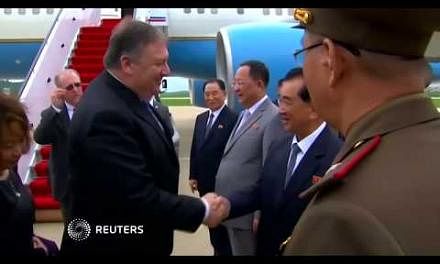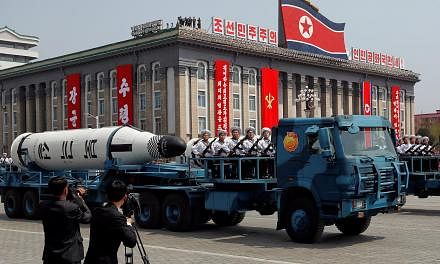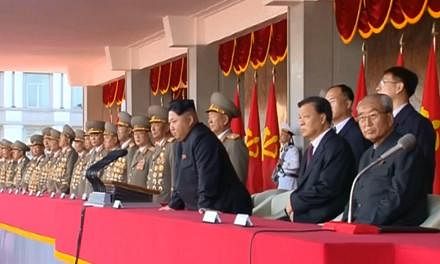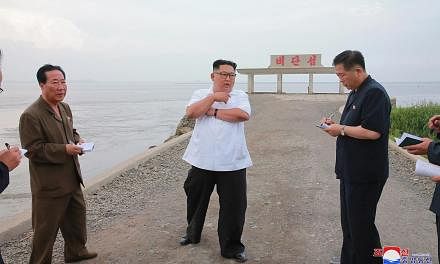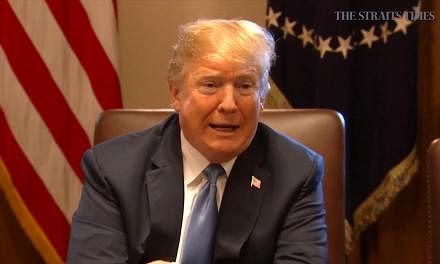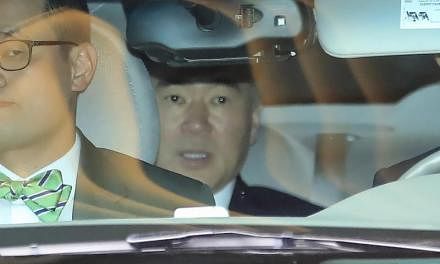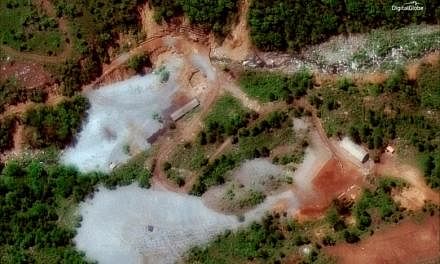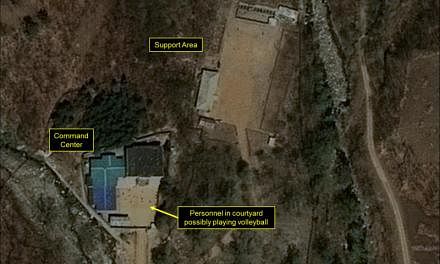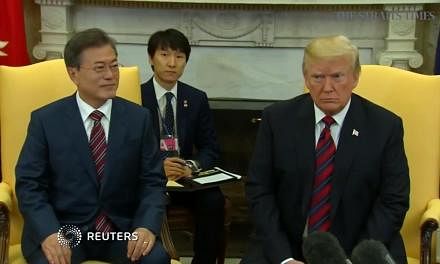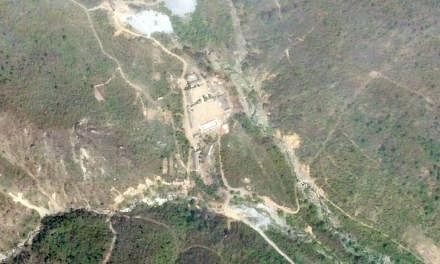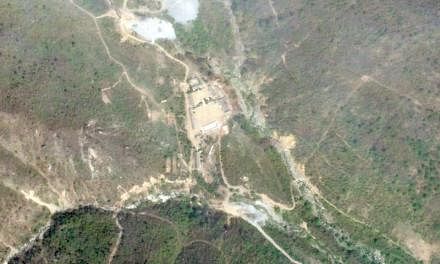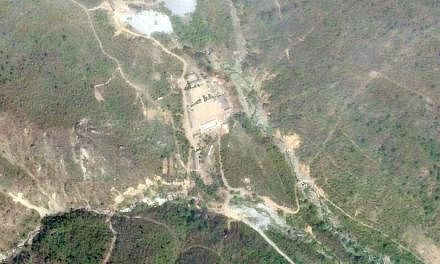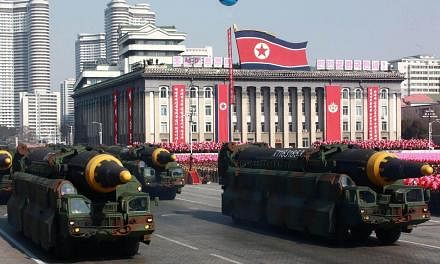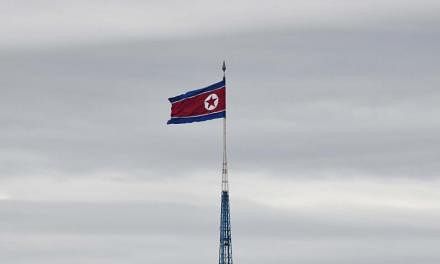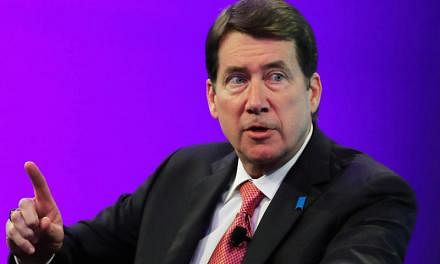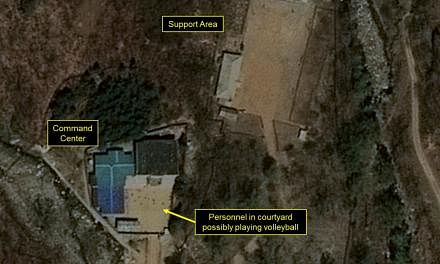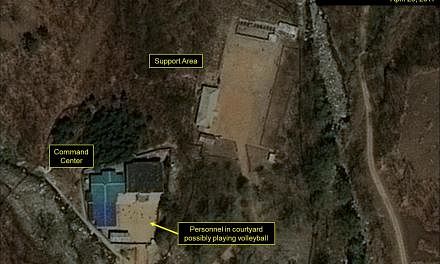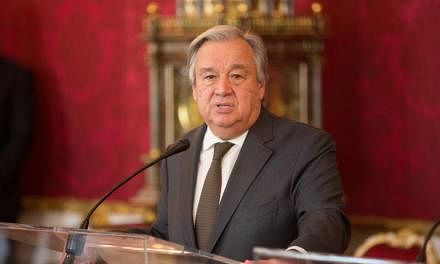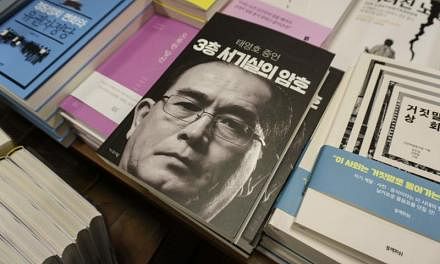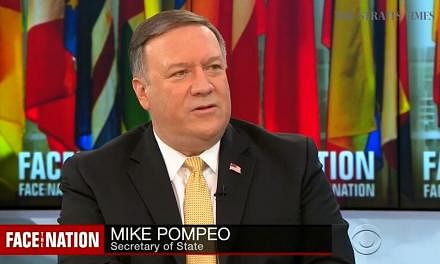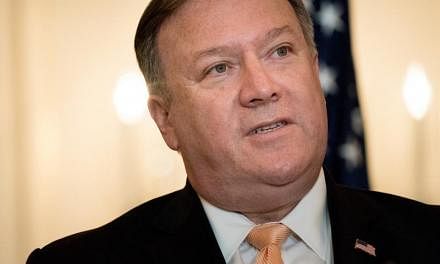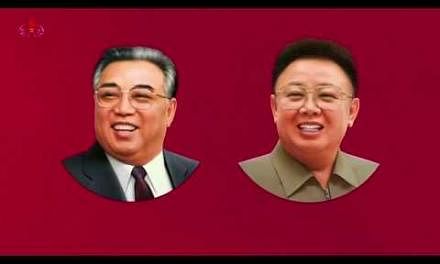TOKYO/BEIJING - Japan and China lauded the rare talks between the two Koreas on Tuesday (Jan 9) as positive, though a wary Tokyo has advised against the world prematurely letting its guard down.
Japanese chief Cabinet secretary Yoshihide Suga said the North still presents a "grave and imminent threat" to regional security with its ballistic missiles and nuclear development programme, and that it was crucial to continue cranking up the pressure on Pyongyang.
Beijing, however, was more sanguine in its belief that the dialogue marked a good start towards an easing of tensions on the Korean peninsula.
Chinese Foreign Ministry spokesman Lu Kang told a regular press briefing: "China welcomes and supports the recent positive initiatives taken by both sides to ease their mutual relations. We also hope that the international community can fully support and encourage this."
Tuesday's dialogue, held at the "truce village" of Panmunjom, was the first between the two countries since 2015. It was hastily arranged after North Korean leader Kim Jong Un's unexpected olive branch in his New Year's address, though he also vowed not to let up on efforts to deploy nuclear warheads and ballistic missiles.
Observers have said, citing history, that the abrupt gesture could just be a ploy by the North to drive a wedge in ties between the United States and its allies, Japan and South Korea. Wary that the South might be too eager to give in, Tokyo deployed a key envoy to Seoul over the weekend to reiterate its hardline position.
Over multiple occasions last year, Prime Minister Shinzo Abe has maintained that dialogue for the sheer sake of dialogue was pointless, citing precedents in which Pyongyang had duped Tokyo into making concessions at the negotiation table but without upholding its end of the bargain.
Mr Suga said Tuesday's talks were welcome insofar as the North's willingness to take part in the Pyeongchang Winter Olympic Games, which will be held in South Korea from Feb 9 to 25, and which he described as a "festival of peace". Foreign Minister Taro Kono stressed that maximum pressure was necessary such that Pyongyang will realise there will be "no bright future" if it persists in developing weapons of mass destruction.
The remarks came as Seoul said it might consider temporarily lifting certain sanctions against Pyongyang if this was necessary to ensure the latter's participation in the Games. The two Koreas also agreed to hold military talks and resume a military hotline to ease border tensions, and the South proposed resuming family reunions for those separated in the Korean War.
Korea observer Zhang Liangui of the Central Party School in Beijing said North Korea had taken the initiative because it felt it has completed its nuclearisation programme - and not because it was feeling the heat from tough sanctions.
Last year, North Korea fired 23 missiles over 16 tests, with the last being an intercontinental ballistic missile that it claims put all of the US mainland within reach. Another two of its missiles flew over the northern Japanese island of Hokkaido. In September, the North conducted its sixth nuclear test, a hydrogen weapon that packed a punch 15 times greater than the atomic bomb which flattened Hiroshima in World War II.
Professor Zhang said that Pyongyang sees its next step as pursuing the "strategic aim" of diplomacy "to force the international community to recognise it as a nuclear country". He added: "By improving relations with South Korea, it can destroy the international cooperation on anti-nuclear proliferation."
Korea expert Shunji Hiraiwa of Nagoya's Nanzan University told The Straits Times that it was natural for Japan to retain a healthy dose of scepticism, given that North Korea sees its participation in the Olympics as an "entirely separate issue" from its weapons programme. But he expressed cautious hope that a growing rapprochement could be possible were Pyongyang to make compromises with Seoul and follow through on them.
Dr Masashi Nishihara, president of the Research Institute for Peace and Security in Tokyo, however, said the odds of Pyongyang giving up its weapons programme were "almost zero to none". Hence, much as progress could be made on "feel-good" humanitarian issues, the two sides are still deadlocked over security issues.
Pyongyang on Tuesday "strongly objected" to South Korean media reports that the talks yesterday would be about Pyongyang's nuclear programme.
"This is a repetition of the past," Dr Nishihara said. "They're trying to buy time to keep developing more sophisticated nuclear weapons and so we should not be fooled. South Korea should have laid out conditions in agreeing to the talks."
Temple University Japan's director of Asian studies Jeffrey Kingston, however, sees a positive in the pause - if not an end - to the sabre-rattling. He said: "We are a long way away from any resolution of the current crisis, but with no viable military solution, any engagement is a positive development."
"We've been here in the past when things looked promising before everything fell apart, so we can't be too optimistic. Even so, it is better to be engaging than not."
Also advocating scepticism was Dr Lee Sung Yoon, professor of Korean studies at the Fletcher School of Law and Diplomacy in the US. He saw the two nations' vow to "respect past declarations and solve future issues as parties directly involved in the Korean peninsula" as one that might be a "code for defying the US".
He said: "Taking charge of Korean national reconciliation is a powerful message that resonates in North and South Korea."
But Professor Zhang said that a watchful US "will not allow any improvement of ties to go too far" so long as Pyongyang continues its weapons programme.
Additional reporting by Nirmal Ghosh in Washington.

